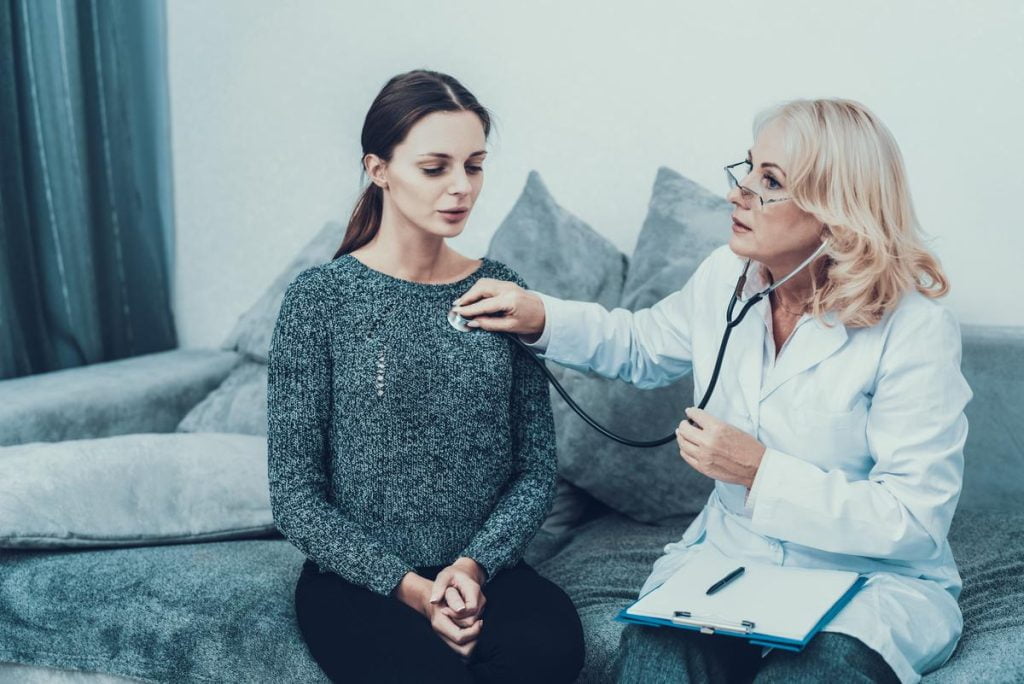
7 Minutes
Anorexia nervosa is a complex and potentially life-threatening eating disorder characterized by an intense fear of gaining weight and a distorted perception of one’s body weight or shape. Individuals with anorexia often have restrictive eating patterns and may severely limit their food intake, leading to significant weight loss and malnutrition. The consequences of anorexia nervosa can be severe, affecting physical and mental health.
Recognizing the need for specialized care, many individuals with anorexia opt to join treatment centers. These centers provide a supportive space where patients can receive comprehensive care from a team of medical professionals and support staff who understand the disorder’s complexities.

When someone decides to join a rehab for anorexia, they take a courageous step towards recovery. It is a recognition that they need help and a commitment to prioritize their health and well-being.
Read Also About Best Eating Disorders Treatment Centers
Treatment centers offer various services tailored to address the challenges individuals with anorexia face. They provide a multidisciplinary approach combining different types of therapeutic interventions. By seeking help at a rehab, individuals can address the underlying challenges of anorexia nervosa, improve their relationship with food, and rebuild their lives.
Phases Of Treatment At Anorexia Nervosa Treatment Centers
The primary anorexia treatment steps address the condition’s physical, psychological, and emotional aspects. They provide patients with the tools and support to heal and regain a healthy relationship with food and their bodies. Here are the common phases of treatment at anorexia rehab centers:
Assessment and Evaluation: Upon admission to a treatment center, a thorough assessment is conducted to understand the individual’s medical history, current physical condition, and psychological well-being. The evaluation helps create a personalized treatment plan customized to the individual’s needs.
Medical Stabilization
In cases of severe malnutrition or medical complications, the initial focus is on stabilizing the individual’s physical health. It may involve medical interventions, such as nutritional support through a carefully monitored meal plan, vitamin and mineral supplementation, and weight restoration.
Nutritional Rehabilitation
Nutritional rehabilitation is a critical component of anorexia nervosa treatment. Rehab centers have experienced dieticians who create balanced meal plans to restore weight, replenish nutrient deficiencies, and establish a healthy relationship with food. These meal plans are supervised and supported by staff to ensure compliance and address any challenges that may arise.
Individual Therapy
Individual therapy plays a vital role in treating anorexia nervosa. Treatment centers typically provide one-on-one counseling sessions with experienced therapists specializing in eating disorders. These sessions focus on exploring underlying emotional issues, distorted body image and developing coping strategies to address the root causes of the condition.
Group Therapy
Group therapy offers people with anorexia the opportunity to connect with others facing similar challenges. Sharing experiences, challenges, and successes can promote a sense of belonging and provide valuable peer support. Group therapy sessions may include discussing body image, self-esteem, and coping mechanisms.
Family Therapy
Anorexia nervosa affects not only the individual but also their loved ones. Family therapy is an essential component of treatment, as it helps family members understand the disorder, learn effective communication strategies, and provide support throughout the recovery process. Family involvement can greatly contribute to the individual’s overall success in treatment.
Psychoeducation
Educating people about anorexia nervosa and its effects is crucial for long-term recovery. Rehabs offer psychoeducational sessions to help individuals understand the psychological and physiological aspects of the disorder, identify triggers, and learn healthy coping skills.
Aftercare Planning
As individuals near the end of their stay, the focus shifts to developing a comprehensive aftercare plan. The plan may include continued therapy, outpatient support groups, nutritional monitoring, and regular check-ins with healthcare professionals. Aftercare plans provide ongoing support and help individuals maintain their progress and prevent relapse.
With professional support, a structured environment, and a multidisciplinary approach at a rehab, individuals can embark on a path toward lasting recovery and a more fulfilling life.
How To Select A Suitable Treatment Center For Anorexia
Selecting a rehab for anorexia nervosa is a crucial decision that can greatly impact the success of the recovery. The following are some key factors to consider when checking anorexia treatment centers:
- Specialization and Expertise: Look for rehabs specializing in eating disorders and have a team experienced in treating anorexia nervosa. The best anorexia nervosa treatment centers have a multidisciplinary approach, including medical, nutritional, and psychological expertise, to provide comprehensive care.
- Accreditation and Licensing: Verify if the rehab is accredited and licensed by recognized governing bodies. Accreditation ensures that the center meets standards of care, while licensing guarantees compliance with local regulations. These credentials assure quality and safety.
- Treatment Philosophy: Understand the philosophy and approach of the rehab. Different centers may have varied anorexia nervosa treatment therapies, such as cognitive-behavioral therapy (CBT), dialectical behavior therapy (DBT), or psychodynamic therapy. Choose a center whose treatment philosophy aligns with your personal preferences and needs.
- Level of Care: Rehabs offer various anorexia nervosa treatment options, from residential/inpatient programs to partial hospitalization or intensive outpatient programs. Consider the level of care that suits your current condition and requirements. For severe cases, a residential program may be necessary initially, while others may benefit from less intensive options.
- Size and Environment: Consider the size and environment of the center. Some individuals prefer a smaller, more intimate setting, while others thrive in a larger facility with more amenities and recreational activities. Visiting the center in person, if possible, can help you assess the atmosphere and determine if it feels supportive and conducive to recovery.
- Relapse Prevention and Aftercare: Inquire about the center’s relapse prevention programs and aftercare support. Recovery from anorexia nervosa is an ongoing process, and a rehab that emphasizes long-term support and provides comprehensive aftercare planning can greatly contribute to sustained recovery.
- Family Involvement: Anorexia nervosa often affects the entire family. Look for a center that recognizes the importance of family involvement and offers family therapy or education sessions to foster understanding and support.
- Insurance Coverage and Financial Considerations: Understand the center’s payment options and whether they accept insurance. Review your insurance coverage to determine what expenses are covered. If finances are a concern, explore the center’s financial assistance or payment plans.
- Reputation and Reviews: Research the reputation of the rehab by reading reviews and testimonials from former patients and their families. Positive feedback and success stories indicate the center’s effectiveness and dedication to quality care.
- Personal Gut Feeling: Trust your instincts. Choose a treatment center where you or your loved one feel comfortable, safe, and supported. The personal connection and trust between the individual and the treatment center can significantly enhance the recovery experience.
Selecting the right rehab for anorexia nervosa requires careful consideration of these factors. Take the time to gather information, ask questions, and consult with healthcare professionals to ensure you make an informed decision that aligns with your needs.
FAQs
How long is the treatment for anorexia at a rehab center?
The duration of treatment can vary depending on the individual’s needs and the severity of their condition. Generally, treatment for anorexia nervosa at rehab can range from a few weeks to several months. Remember that recovery from an eating disorder is a gradual process, and the treatment duration will depend on the progress made by the individual.
What if I have another mental health issue alongside anorexia nervosa?
It is common for individuals with anorexia nervosa to have co-occurring mental health issues such as anxiety, depression, or obsessive-compulsive disorder. A reputable center will have a professional team experienced in treating both anorexia and other mental health conditions. The treatment plan will be personalized to address all the presenting issues simultaneously, ensuring comprehensive care and promoting overall well-being.
Can family members visit during treatment?
The policies regarding visitation at treatment centers may vary. Some may have scheduled family visitation days or specific visitation hours. Inquire about the visitation policy before selecting a rehab. Family involvement and support are often encouraged in treating anorexia nervosa, so most centers strive to accommodate family visits within the framework of the treatment program.
What are some common luxury anorexia treatment facilities at a rehab?
Luxury treatment facilities at rehabs provide comfort and specialized care. Here are some common features and amenities:
- Upscale Accommodations
- Gourmet Dining
- Spa and Wellness Services
- Swimming pools
- Fitness Facilities
- Holistic Therapies
- Access to Nature
- Privacy and Confidentiality
A UNIQUE METHOD
a successful and proven concept focusing on underlying causesLASTING APPROACH
0 Before
Send Admission Request
0 Before
Define Treatment Goals
1 week
Assessments & Detox
1-4 week
Psychological & Holistic Therapy
4 week
Family Therapy
5-8 week
Aftercare
12+ week
Refresher Visit
Anorexia Insights
latest news & research on Anorexia
Best Anorexia Treatment Centers
The best anorexia nervosa treatment centers have a multidisciplinary approach, including medical, nutritional, and psychological expertise, to provide comprehensive care
read moreHow To Recover From Anorexia
It's common for people suffering from anorexia to believe that they'll never be happy unless they lose weight and that their worth is based on their appearance. Self-esteem and happiness, on the other hand, come from appreciating yourself for who you are, which is only achievable through recovery.
read more
Anorexia Nervosa Diagnosis and Treatment
read more


























































